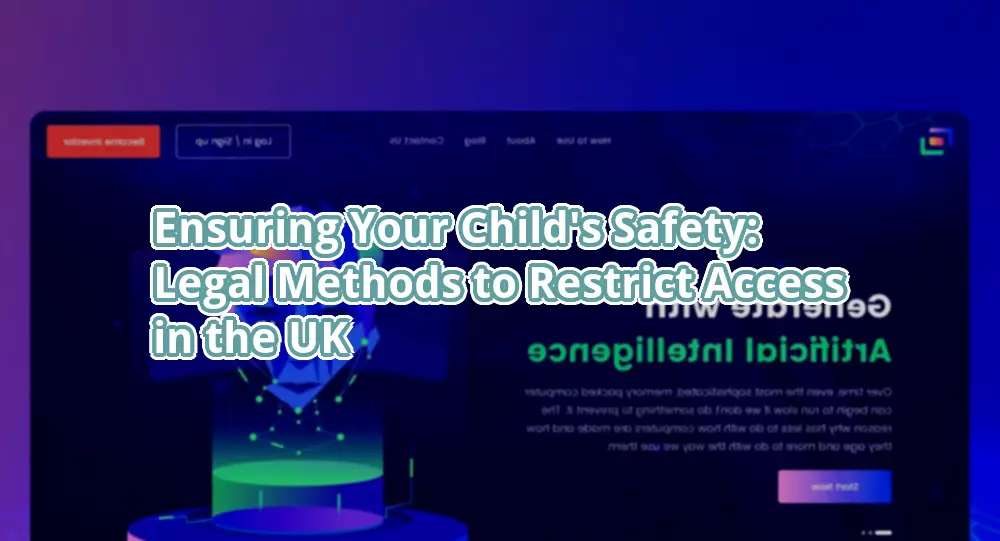How to Legally Stop Someone from Seeing Your Child in the UK
Introduction
Hello twibbonnews readers,
Welcome to this informative article that aims to provide you with valuable insights on how to legally stop someone from seeing your child in the UK. We understand that safeguarding the well-being of your child is of utmost importance, and we are here to guide you through the legal process involved in ensuring their safety. In this article, we will discuss the strengths and weaknesses of the legal methods available, provide detailed explanations, and address frequently asked questions to empower you with the necessary knowledge.
Strengths and Weaknesses
1. Strength: Obtaining a Child Arrangements Order (CAO) – A CAO is a court order that determines where a child should live, who they should have contact with, and when. This order can provide a legally binding solution to prevent someone from seeing your child.
🔑 Weakness: Burden of Proof – To successfully obtain a CAO, you must provide sufficient evidence to demonstrate that it is in the child’s best interests to restrict contact with the individual in question.
2. Strength: Restraining Orders – If you have concerns about the safety or well-being of your child, you can apply for a restraining order. This legal measure prohibits the individual from contacting or approaching your child.
🔑 Weakness: Limited Effectiveness – Restraining orders rely on the cooperation of the individual against whom they are issued. Violations can occur, and enforcement may be challenging.
3. Strength: Mediation and Negotiation – In some cases, mediation or negotiation can assist in reaching an agreement that satisfies both parties involved, without the need for court intervention.
🔑 Weakness: Lack of Binding Effect – Agreements reached through mediation or negotiation are not legally binding. If the other party fails to comply, you may need to pursue legal action.
4. Strength: Change of Residence – If you believe that a change of residence is necessary to protect your child, you can apply for a Specific Issue Order. This order allows you to change the child’s residence without the consent of the other parent.
🔑 Weakness: Disruption and Emotional Impact – Relocating a child can be emotionally challenging and may disrupt their routine and relationships.
5. Strength: Prohibited Steps Order – A Prohibited Steps Order prevents an individual from taking specific actions regarding your child, such as removing them from the country without your consent.
🔑 Weakness: Limited Scope – Prohibited Steps Orders only address specific actions and may not provide a comprehensive solution to prevent someone from seeing your child.
Table: Legal Methods to Stop Someone from Seeing Your Child
| Method | Strengths | Weaknesses |
|---|---|---|
| Child Arrangements Order (CAO) | Legally binding solution | Burden of proof |
| Restraining Orders | Prohibits contact or approach | Dependent on cooperation |
| Mediation and Negotiation | Potential for mutual agreement | Not legally binding |
| Change of Residence | Protective measure | Disruption and emotional impact |
| Prohibited Steps Order | Prevents specific actions | Limited scope |
Frequently Asked Questions
1. Can I stop someone from seeing my child without going to court?
Yes, if both parties agree, you can establish alternative arrangements through mediation or negotiation without involving the court.
2. How can I gather evidence to support my case?
Collect any relevant documents, messages, photographs, or witness statements that can demonstrate why restricting contact with the individual is in your child’s best interests.
3. What should I do if the other party violates a court order?
Report the violation to the court immediately. Depending on the severity, consequences may include fines, community service, or even imprisonment.
4. Can the court order supervised visits?
Yes, if the court determines it necessary, they can order supervised visits to ensure the safety and well-being of your child during contact.
5. What if the person seeking contact is the child’s biological parent?
The court considers the child’s welfare as the paramount concern. While biological parenthood is significant, it does not guarantee automatic contact rights if it is deemed detrimental to the child.
6. Can I change my child’s surname without the other parent’s consent?
Changing a child’s surname requires the consent of all individuals with parental responsibility. If the other parent refuses to provide consent, you may need to seek a Specific Issue Order from the court.
7. Can I prevent grandparents from seeing my child?
In certain circumstances, grandparents can apply for a CAO to establish contact. However, the court will always prioritize the child’s best interests when making decisions.
Conclusion
In conclusion, navigating the legal process of stopping someone from seeing your child in the UK requires careful consideration and understanding of the available options. From obtaining a Child Arrangements Order to exploring alternative dispute resolution methods, you have several avenues to ensure your child’s well-being. However, it is essential to acknowledge the strengths and weaknesses of each approach to make informed decisions. Remember, the welfare of your child should always be the guiding principle throughout this challenging process.
Empower yourself with the knowledge provided in this article, consult legal professionals when necessary, and take the appropriate steps to protect your child’s safety. Your dedication as a parent is vital in creating a secure and nurturing environment for your child.
Closing Words and Disclaimer
Thank you for reading this comprehensive guide on how to legally stop someone from seeing your child in the UK. It is important to note that the information provided in this article is for general guidance purposes only and should not be considered legal advice. Laws and regulations may vary depending on your specific circumstances, so it is advisable to consult with a qualified legal professional for personalized assistance. Remember, each case is unique, and seeking professional advice will ensure the best possible outcome for you and your child. Stay informed, stay empowered, and prioritize your child’s well-being above all else.

